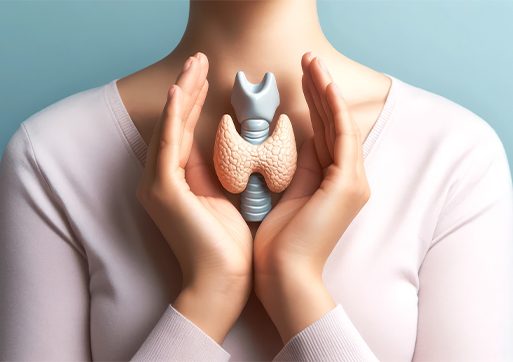Understanding Thyroid Conditions
How Well Do You Know Your Thyroid?
Hypothyroidism is the most common reason for needing thyroid support, although many people don’t realize thyroid hormones may be the root cause of a variety of symptoms. Learn more about health conditions and available therapies designed to optimize thyroid function.

How to Support the Thyroid
The thyroid is a small butterfly-shaped gland at the base of the neck that makes T4, the thyroid hormone. This hormone helps the body use energy, stay warm, and maintain organ functioning.
Thyroid hormones are a form of thyroid support that works to replace hormones a damaged thyroid gland may not be producing. Thyroid hormones may also help suppress growth or regrowth of thyroid tumors. Examples of thyroid hormones are T4 (Thyroxine) and T3 (Triiodothyronine).
Thyroxine, or T4, is the primary inactive thyroid hormone. T4 has a naturally longer half-life, meaning its activity slowly releases over time. T4 is converted to the biologically active form T3, triiodothyronine. T3 has a shorter half-life than T4. Both are produced by the thyroid gland and are used in thyroid support therapy. Conditions like hypothyroidism require a form of thyroid support therapy.
Hypothyroidism: Possible Causes
When the thyroid doesn’t make as much T4 as the body needs, hypothyroidism is often to blame. This can be caused by disease, surgery, radiation, or a pituitary gland that isn’t sending appropriate signals to the thyroid.
An under-functioning thyroid gland is a common endocrine issue and the most common cause of hypothyroidism. In the autoimmune disease Hashimoto’s Thyroiditis, the body attacks its own thyroid hormone producing cells.
Hypothyroidism can also be caused by radioactive treatment or surgery on the thyroid gland. Problems with the pituitary gland can also cause hypothyroidism by interrupting the feedback loop. Congenital hypothyroidism, present from birth, occurs when the thyroid gland does not develop properly.


Hypothyroidism: Potential Symptoms
When thyroid hormone levels are too low, the body’s processes slow down. Symptoms vary from person to person and can be difficult to attribute to thyroid issues alone. Feeling colder, easily exhausted, forgetful, or depressed can all be signs of an underperforming thyroid. Other symptoms may include dry skin, weight gain, and constipation. Due to the wide range of possible problems connected to thyroid conditions, diagnostic testing with a medical professional is critical.
Once a thyroid condition is identified, there are many therapeutic options available to restore the body’s thyroid hormone balance.
Medications to Address Thyroid Conditions
Thyroid support therapy helps the body replicate proper thyroid functioning. Types of thyroid medications include synthetic thyroid and desiccated thyroid extract.
Synthetic Thyroid Therapies
Synthetic thyroid is available as both a commercial and compounded product. This form of thyroid hormone is biologically equivalent to the T3 and T4 in the human body, meaning it mimics natural thyroid hormones.
Compounded Synthetic Thyroid Medications at MedQuest
- Synthetic T3: Liothyronine Sodium (Powder Capsules)
- Synthetic T4: Levothyroxine Sodium (Powder Capsules)
Commercially Available Synthetic Thyroid Products at MedQuest
- Synthetic T3: Cytomel (generic name, Liothyronine)
- Synthetic T4: Synthroid/Levoxyl/Unithroid/Tirosint (generic name, Levothyroxine)
- Product availability from commercial manufacturers may vary
Desiccated Thyroid Therapies
Desiccated thyroid is an extract from dried porcine thyroid gland tissue. This form of thyroid is made up of T3 and T4 and other triiodothyronine compounds. One grain of desiccated thyroid is roughly equivalent to 9 mcg T3 and 38 mcg T4 (a ratio close to 1:4).
Compounded Desiccated Thyroid Extract Medications at MedQuest
- Desiccated Porcine Thyroid Extract Powder Capsules
Commercially Available Desiccated Thyroid Extract Products at MedQuest
- Armour® Thyroid
- NP Thyroid®
- Product availability from commercial manufacturers may vary
Some patients may require a combination of synthetic T4 and T3, while others may find porcine thyroid benefits them most. Your provider will target the dose to address blood levels and symptoms and find the best fit for your condition. Your body’s thyroid requirements can change, based on your medications, shifts in age and weight, stress levels, as well as GI function.
